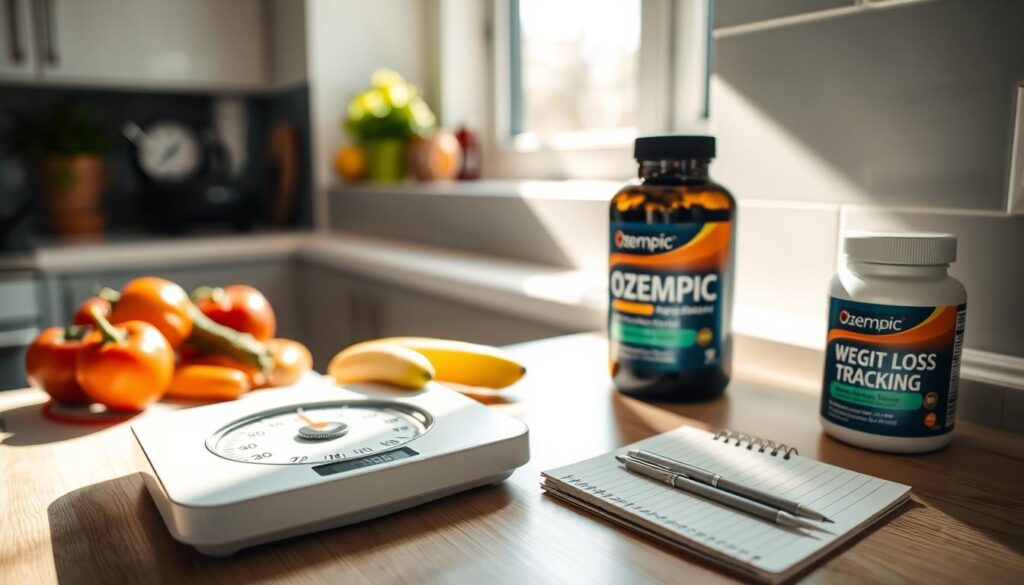If you’re taking Ozempic (semaglutide) for weight management and aren’t seeing the results you expected, you’re not alone. Ozempic is good for type 2 diabetes and weight loss. But, losing weight can be slow, especially at first.
It usually takes 3-4 months to get to the best dose of 1-2 mg of Ozempic each week. At this dose, you might lose up to 7% of your body weight in a year. But, how much you lose depends on many things. These include your health, BMI, how much Ozempic you take, your lifestyle, and how your body reacts to it.
Key Takeaways
- Ozempic can take 3-4 months to reach the optimal 1-2 mg weekly maintenance dose, which impacts the initial rate of weight loss.
- Higher Ozempic doses are typically associated with greater weight loss compared to lower doses.
- Lifestyle changes, such as dietary modifications and increased physical activity, can enhance the effectiveness of Ozempic for weight loss.
- Underlying health conditions like hypothyroidism and PCOS can affect weight loss outcomes on Ozempic.
- Consistent adherence to the prescribed Ozempic dosing regimen is crucial for optimizing the medication’s efficacy and minimizing side effects.
Understanding Ozempic and Weight Loss Expectations
Ozempic acts like a hormone in your body. It slows down digestion and tells your brain you’re full. Studies show people lose 5-10% of their weight with weekly Ozempic shots.
On average, people lost 5.9% of their weight after three months. And 10.9% after six months. But, don’t expect to lose a lot of weight right away.
Ozempic works best with healthy habits and exercise. Eating well and moving more can help you lose more weight. Knowing what to expect with Ozempic helps you set realistic goals.
While Ozempic may help with weight loss or stalls, it’s key to eat right and exercise. This way, you can lose weight for good and feel better overall.
“Ozempic is a powerful tool, but it works best when combined with lifestyle changes. Be patient and committed, and you’ll see the results you’re looking for.”
Weight loss is a journey. It takes time, effort, and being open to change. Knowing what to expect with Ozempic helps you succeed and use its benefits well.
No Weight Loss on Ozempic: Common Causes
If you’re taking Ozempic (semaglutide) for weight loss but not losing weight, there are reasons. Lifestyle, health issues, and how your body works can affect Ozempic’s weight loss power.
Lifestyle-Related Factors
One big reason for no weight loss on Ozempic is not changing diet and exercise enough. To lose weight with Ozempic, eat fewer calories and more nutrients. Also, eat lots of protein and fiber, and avoid processed foods and sugars.
Stress and bad sleep can also stop Ozempic from working well. Stress can make you eat more, and not enough sleep can make you hungry and slow down your metabolism. Try to manage stress and sleep well to help with Ozempic weight loss.
Medical Factors
Medical problems like hypothyroidism, sleep apnea, or insulin resistance can make Ozempic ineffective for weight reduction. You might need to treat these conditions first for Ozempic to work.
Some medicines, like antidepressants and beta-blockers, can make you gain weight or mess with Ozempic. Talk to your doctor about any medicines you’re taking.
Knowing why you’re not losing weight on Ozempic is key. Fixing any health issues and changing your lifestyle can help Ozempic work better. This way, you can reach your weight loss goals.
The Role of Proper Dosage and Timing
To get the best results with Ozempic for losing weight, knowing the right dose and when to take it is key. Start with 0.25 mg once a week. Then, increase it every four weeks until you reach 1-2 mg per week.
Being consistent with Ozempic shots is very important. If you skip doses or don’t take them at the same time, it won’t work as well. You might need a higher dose to see results. Always talk to your doctor to find the best dose for you.
Also, your body might get used to Ozempic over time. This is called tachyphylaxis. You might need to change your dose to keep losing weight.
“Proper dosage and consistent timing are crucial for Ozempic’s effectiveness in supporting weight loss.”
By sticking to the Ozempic dosage and timing advice, you can get the most out of it. Always talk to your doctor to make a plan that fits you. They will consider your health and what you need.

Making Lifestyle Changes for Enhanced Results
To get the most out of Ozempic, making lasting lifestyle changes is key. This means changing what you eat and how much you move. These steps help Ozempic work better and help you reach your weight loss goals.
Dietary Modifications
Changing your diet is crucial for diet changes for ozempic weight loss. Eat fewer calories and more protein (10-35% of daily calories) and fiber (25-38g daily). Avoid foods high in sugar, refined carbs, and alcohol. They can slow down your progress.
Practice mindful eating and think about getting help from a dietitian. They can give you nutrition on ozempic advice that fits you.
Physical Activity Guidelines
Being active is important for Ozempic’s weight loss benefits. Try to do at least 150 minutes of moderate exercise like brisk walking each week. Mix in strength training to build muscle and speed up your metabolism.
Staying active with exercise with ozempic helps you lose weight and feel better overall. It’s all about a balanced approach to diet and physical activity for weight loss.
By focusing on diet and exercise, you can unlock Ozempic’s full potential. These lifestyle changes will help you on your weight loss journey and lead to the best results.
“Consistency is key when it comes to diet and exercise. Small, sustainable changes can lead to significant long-term results.”

Breaking Through Weight Loss Plateaus
Reaching a weight loss plateau can be frustrating. It’s a common experience for many people on Ozempic or other weight loss meds. The key is to understand the causes and take steps to overcome them.
First, look at your diet and exercise. Make sure you eat a balanced diet with the right number of calories. Eating more protein can help your metabolism and keep you full. Also, adding resistance training can help build muscle and support your weight loss.
If you’ve checked your lifestyle but still can’t lose weight, talk to your healthcare provider. They might suggest changing your Ozempic dosage. Or they could look into other medication options to help restart your weight loss on ozempic.
Remember, overcoming ozempic weight loss plateau takes time and effort. Weight loss might slow down after the first fast phase. But keep using your medication and making healthy lifestyle changes for long-term success. Stay motivated and don’t hesitate to ask for help to overcome ozempic weight loss plateau and reach your health goals.
“Patience and consistency are key when it comes to overcoming weight loss plateaus on Ozempic. With the right approach and support, you can push past those challenges and reach your desired goals.”
By tackling the common causes of weight loss plateaus and making smart changes, you can restart your weight loss on ozempic. Remember, the journey to sustainable weight loss isn’t always straight. But with determination and the right tools, you can beat any obstacle.
Conclusion
To get the most out of Ozempic®, you need a plan that’s just for you. Use the medicine every day and eat right. Also, exercise, manage stress, and sleep well.
If you’re not losing weight, talk to your doctor. They can help fix any problems or change your plan. This might include trying something new.
Everyone reacts differently to Ozempic®. What works for one person might not work for you. It’s important to find what works best for you.
For lasting weight loss, you need more than just medicine. It’s about making big changes in your life. With hard work and help from your doctor, you can reach your goals.


A Life-Changing Experience with This Weight Loss Supplement (Nagano Tonic)
I’ve always struggled with finding a weight loss solution that actually works for me. Like many, I’ve tried numerous diets, exercise routines, and supplements over the years—some worked for a short time, but nothing ever gave me long-term results. That was until I decided to try the weight loss supplement I found : Link to the Supplement.
From the moment I started using it, I noticed a difference. Not only did I feel more energized, but my cravings also became more manageable. The best part? I started seeing results much quicker than I anticipated! Over the course of just a few weeks, I noticed a significant reduction in belly fat and overall weight loss that I hadn’t been able to achieve before.
What makes this supplement stand out from all the others I’ve tried is how it supports me in my daily routine without any jitters or energy crashes. I’m able to stay focused and motivated, which has made it easier to stay on track with my diet and exercise plan.
This product truly exceeded my expectations, and I feel more confident and healthier than ever before. If you’re struggling with your weight loss journey like I was, I highly recommend giving this supplement a try. It’s been a game-changer for me, and I’m sure it can work wonders for you too!
Contant Them on email .. tonicnagano50@gmail.com
I’ve tried so many weight loss products over the years, but nothing worked like this supplement! Since I started using it, I’ve noticed a big difference in my energy levels and appetite control. In just a few weeks, I’ve lost weight and feel so much better. It’s been easy to stick with, and the results speak for themselves. Highly recommend this to anyone looking to make a real change!
I was skeptical at first, but this supplement has truly made a difference in my weight loss journey. I’ve lost weight without feeling deprived or sluggish. My cravings are under control, and I feel more confident in my body. It’s easy to incorporate into my daily routine, and the results speak for themselves. I’m so glad I gave it a try!
Thanks David, i do use the link to make my purchase. you can get too here http://surl.li/iasppy
wasn’t sure what to expect, but this weight loss supplement has really impressed me! After just a few weeks of use, I’ve already dropped a few pounds and feel more motivated to stay active. It’s helped curb my cravings and boosted my energy throughout the day. I’m excited to keep going and see even better results. Definitely worth trying!
Reach them on tonicnagano50@gmail.com
I’ve tried so many weight loss products, but this one has been by far the most effective. In just a few weeks, I’ve noticed a visible difference in my body and energy levels. It’s helped me stay on track without the constant hunger pangs and cravings. I’m really happy with my progress and can’t wait to see where I’ll be in another month!
This Nagano Tonic has been amazing! In just a few weeks, I’ve lost weight, feel more energized, and my cravings are under control. Highly recommend it!
Thats the link to purchase http://surl.li/iasppy